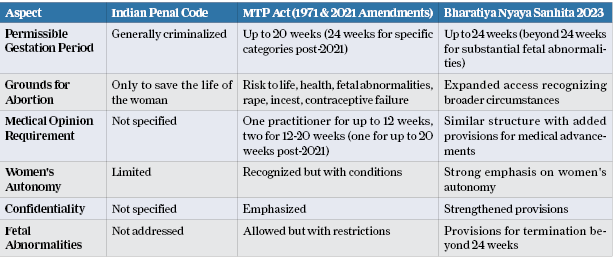The landscape of abortion rights in India is undergoing a transformative shift with the introduction of the Bharatiya Nyaya Sanhita (BNS), 2023. The new legal framework represents a significant departure from the restrictive provisions of the Indian Penal Code (IPC) of 1860 and the more progressive but still limited Medical Termination of Pregnancy (MTP) Act of 1971. As we delve into the comparative aspects of these legal instruments, it becomes clear that the BNS 2023 is poised to set new standards in reproductive rights, aligning India more closely with the global human rights norms and medical advancements.
Historically, the IPC treated abortion as a criminal offense under most circumstances, with severe penalties for both, the women undergoing the procedure and the medical practitioners involved. Sections 312 to 316 of the IPC imposed stringent punishments, reflecting the era’s conservative stance on women’s reproductive autonomy. The only exception allowed was when the abortion was necessary to save the woman’s life. This rigid framework often pushed women towards unsafe and illegal abortions, risking their health and lives.
In contrast, the MTP Act of 1971 marked a progressive step by legalizing abortion under specific conditions, such as risk to the woman’s life, grave physical or mental health issues, fetal abnormalities, pregnancies due to rape or incest, and contraceptive failures. The 2021 Amendments further extended the permissible gestation period to 24 weeks for certain categories of women, including minors and survivors of sexual assault, reflecting a more nuanced understanding of women’s reproductive health needs. However, the requirement for multiple medical opinions and the limited circumstances under which abortions could be legally performed continued to restrict women’s autonomy.

The BNS 2023, however, heralds a new era in abortion rights. It extends the permissible gestation period for abortions up to 24 weeks for a broader category of women and allows terminations beyond 24 weeks in cases of substantial fetal abnormalities. This provision acknowledges the complexities and individual circumstances that may necessitate a late-term abortion. Moreover, the BNS 2023 places a strong emphasis on women’s autonomy, ensuring their right to make decisions regarding their reproductive health without undue interference. The incorporation of medical advancements, such as the use of abortion pills, and strengthened confidentiality provisions aim to make abortion services safer, more accessible, and less stigmatized.
The comparative analysis of these three legislations highlights the significant progress made from the IPC to the MTP Act and now to the BNS 2023. While the IPC criminalized abortion almost entirely, the MTP Act introduced specific grounds and gestation periods for legal abortions. The BNS 2023 builds on these foundations, expanding access and emphasizing a rights-based approach. The following table summarizes these key differences:
Conclusively, it may be stated that the Bharatiya Nyaya Sanhita 2023 represents a monumental leap forward in the legal recognition and protection of abortion rights in India. By expanding access, emphasizing women’s autonomy, and incorporating medical advancements, the BNS 2023 aligns more closely with global standards and human rights principles. However, the success of this new legal framework hinges on its effective implementation and the dismantling of cultural and social barriers that continue to hinder women’s access to safe and lawful abortion services. It is imperative that India continues to strive towards ensuring that all women have the right to make informed decisions about their reproductive health, thereby safeguarding their health, dignity, and autonomy.




















